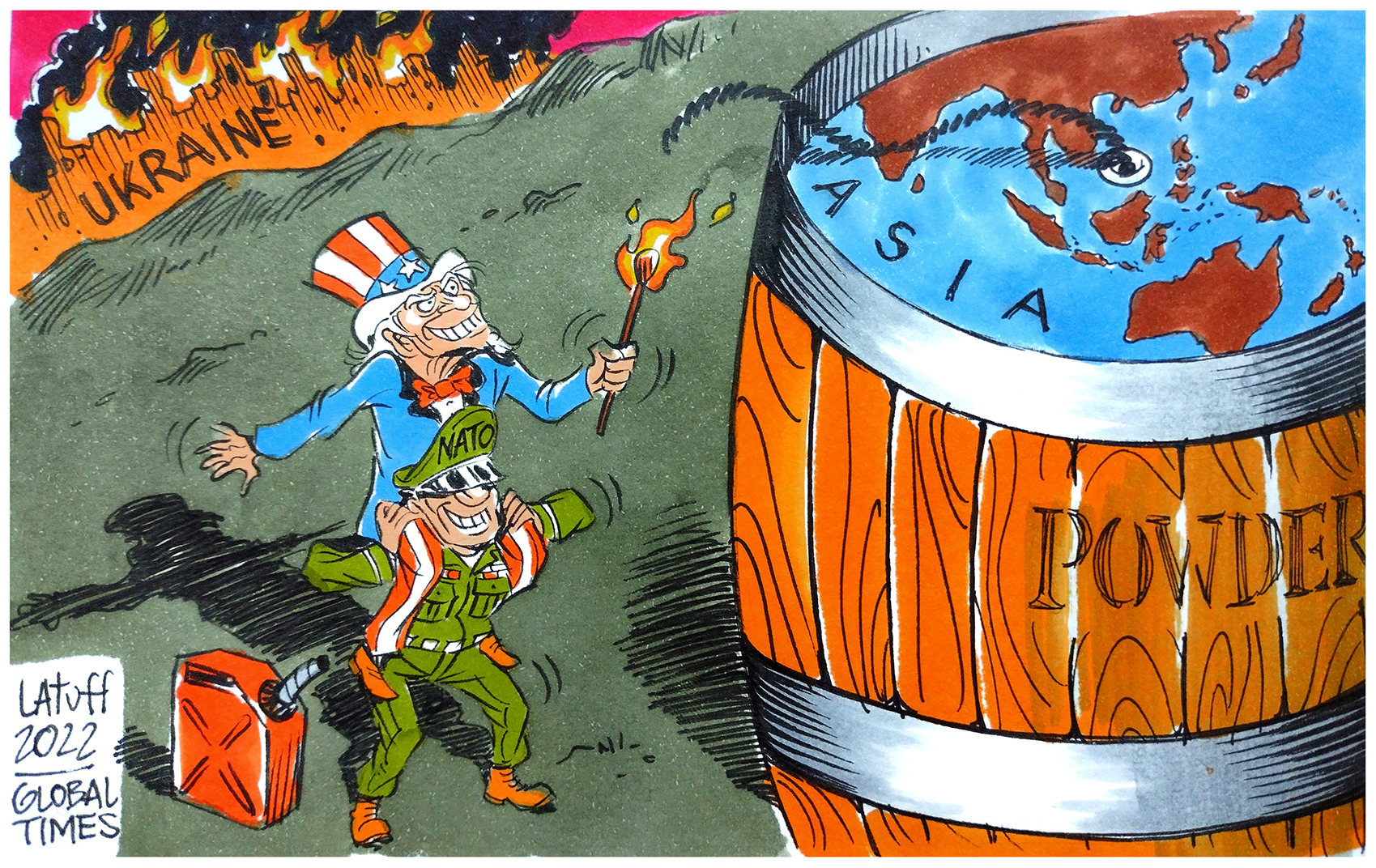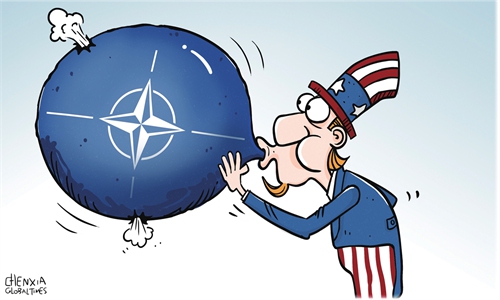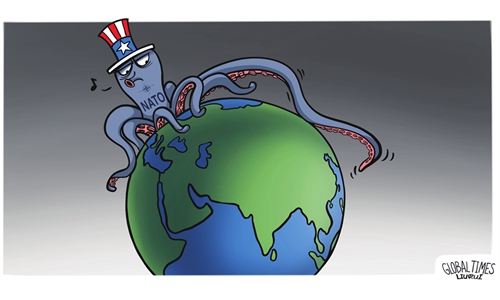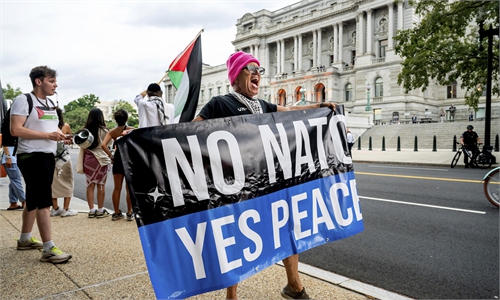China slams NATO as troublemaker at UNSC; 'peace hope for Ukraine crisis remains fragile'

After Ukraine, US-led NATO wants to turn Asia Pacific into a new powder keg. Illustration: Carlos Latuff
China heavily criticized NATO and certain countries as troublemakers at the UN Security Council open debate on Tuesday local time after the US-led military alliance accused China of being a "decisive enabler" of the Russia-Ukraine conflict earlier this month.
Analysts said on Wednesday that as there have been some changes recently on the Ukraine crisis, hopes for peace remain fragile because Washington and NATO will keep making trouble to extend the conflict, and this situation requires China and all relevant parties to make more efforts to preserve these hopes and promote political settlement.
At the opening debate of the UN Security Council on Tuesday, Chinese Ambassador to the UN Fu Cong said "against the backdrop of the crisis in Ukraine and the ongoing Palestinian-Israeli conflict, countries are highly concerned about international common security, and many peace-loving countries and people are working tirelessly to bring peace."
However, NATO, a regional military bloc left over from the Cold War, has been seeking to expand its sphere of influence, stopping at nothing to create false narratives, pouring oil on the fire wherever they go, stirring up confrontation between camps, and even shifting the blame to countries outside the region to frame them on the issue of Ukraine, Fu remarked.
"This is just the opposite of what the international community is doing in promoting peace and negotiations. History has amply proved that wherever NATO's hand extends, turmoil and chaos will ensue. China hereby advises NATO and certain countries to conduct some soul-searching and stop being the troublemakers who jeopardize common security at the expense of others," the Chinese ambassador noted.
The heavy criticism against the US-led military bloc came after NATO called China the "decisive enabler" of the Russia-Ukraine conflict.
Chinese experts said that NATO expansion is one of the key reasons that provoked the Russia-Ukraine conflict, and now NATO is trying to use the war to further legitimize its expansion, not only in Europe but also around the globe, especially in the Asian-Pacific region.
"NATO needs to hype bloc confrontation with other non-Western major powers to maintain its internal unity and to make itself more powerful to serve the interests of the military industrial complex, and this is why it's trying to be hostile against China while confronting Russia at the same time," said a Beijing-based military expert who asked for anonymity.
The US instigates conflicts between different countries in a region and labels some as "enemies or threats to the region," and then it draws or seduces other countries to join its allies and pay for an expensive and dangerous arms race or geopolitical tensions, and eventually provoke a war or military conflict, the expert said. "This is how NATO works, like a vampire hungers for blood," he noted.
Russian Foreign Minister Sergey Lavrov, who is currently president of the UN Security Council, recalled that at the recent summit in Washington that NATO leaders "reiterated their claims for the leading role not only in the Euro-Atlantic region, and also in Asia-Pacific."
"NATO's military infrastructure is moving to the Pacific region with an obvious goal of undermining the ASEAN-centric architecture, which has been built for decades on the principles of equality, due account of each other's interests, and consensus," Lavrov stressed.
Efforts for peace
When NATO and the US fan confrontations and tensions worldwide, China is trying its best to bring peace to end the wars, analysts said.
Chinese Foreign Minister Wang Yi said in his latest phone call with his Hungarian counterpart on Tuesday that China is ready to join hands with Hungary to bring together more forces supporting peace, make more rational voices, and push the situation toward a political settlement.
Currently the most urgent matter and the most realistic goal over the Ukraine crisis is to cool down the tension as soon as possible, Wang, also a member of the Political Bureau of the Communist Party of China Central Committee, said in a phone call with Hungarian Minister of Foreign Affairs and Trade Peter Szijjarto, the Xinhua News Agency reported on Wednesday.
Szijjarto briefed Wang about his views on the current situation, especially on the Ukraine crisis as well as Hungary's recent related efforts, saying that China is an important force supporting the promotion of peace. Hungary is willing to work with China to prevent the escalation of the conflict and accumulate conditions for a political settlement, Szijjarto said.
Wang said on the phone call that "All parties must reach a consensus as soon as possible on the principles of no expansion of the battlefield, no escalation of fighting, and no fanning by any party over the flames, so as to create conditions for a cease-fire and the resumption of peace talks."
Hungarian Prime Minister Viktor Orban has concluded his "peace mission" with trips to Kiev, Moscow, Beijing and Washington this month. And some changes on the Ukraine crisis have emerged recently, said experts.
Ukrainian President Volodymyr Zelenskiy said on Monday that he aimed to have a plan ready in November to enable Kiev to hold a second international summit on his vision of peace in Ukraine, and he said "representatives of Russia should attend," Reuters reported.
Russian news agency Tass reported on Tuesday that Kremlin spokesperson Dmitry Peskov said Russia does not yet understand what Zelenskiy has in mind when he speaks of the "second peace summit."
After his private meeting with former US president Donald Trump, Hungarian Prime Minister Viktor Orban said Trump will quickly demand peace talks between Russia and Ukraine if he wins November's US presidential election and has developed "well-founded plans" for doing so, the Financial Times reported on Wednesday.
Li Haidong, a professor at the China Foreign Affairs University, told the Global Times on Wednesday that these changes are bringing hopes for peace, but the hope remains fragile and unstable, because before the US presidential election this year, NATO may try to add more fuel to the flames.
Li said the results of the US presidential election could change rapidly if there are any more incidents, then there will be changes on Ukraine policy as well.
Military aid to Ukraine is a huge business and hard to stop, so even if Trump wins the election and plans to end the conflict to stop the loss for the US, the interest groups that get benefits from the Ukraine crisis will make it extremely difficult for the new US president, Li noted.




